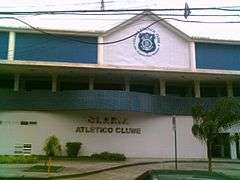Olaria Atlético Clube
 | |||
| Full name | Olaria Atlético Clube | ||
|---|---|---|---|
| Nickname(s) |
Olá Azulão Azulão da Bariri | ||
| Founded | July 1, 1915 | ||
| Ground |
Estádio da Rua Bariri, Rio de Janeiro, Brazil | ||
| Capacity | 11,000 | ||
| President | Edilberth Pellegrini Nahn | ||
| Head coach | Fernando Santos | ||
|
| |||


Olaria Atlético Clube, or Olaria as it is usually called, is a traditional Brazilian football team from Olaria neighborhood, Rio de Janeiro, in Rio de Janeiro state, founded on July 1, 1915. The club name means brick factory, and is also the name of the club's neighborhood.
Olaria is one of the small clubs from Rio de Janeiro that have managed to remain active in the shade of the four big ones (Flamengo, Fluminense, Vasco da Gama and Botafogo).
History
On July 1, 1915,[1] the club was founded as Japonês Futebol Clube (Japanese Football Club, in English). The club was later in that year renamed to Olaria Atlético Clube, by Calorino Martins Arantes, who was a club director, to attract more supporters.[2]
In 1974, Olaria competed in the Série A, finishing in the 28th position.[3]
In 1981, Olaria won the Série C, called Taça de Bronze (Bronze Cup). In the final, the club beat Santo Amaro of Pernambuco state.[4] In 1983, the club won the Campeonato Carioca Second Division, being promoted to the following year's first division.[5] In 1999, an enterprise called Sport News assumed the club's football section for a short time period.[1]
In 2000, Olaria was in the White Module (which was the equivalent of a third level) of that season's Série A, named Copa João Havelange. The club was eliminated in the first stage.[6] In 2003, the club competed again in the Campeonato Brasileiro Série C. Olaria was eliminated in the third stage by fellow Rio de Janeiro state club Cabofriense.[7]
Achievements
- Brazilian Third Division (Taça de Bronze):
- Winners (1): 1981
- Campeonato Carioca Second Level:
- Winners (3): 1931, 1980, 1983
Stadium
Home stadium is Estádio da Rua Bariri, which has a maximum capacity of 11,000 people. This stadium is often rented to the big clubs (notably Flamengo) when they are unable to play at the Maracanã or at the Engenhão.
Anthem
The club's official anthem was composed by Lamartine Babo, who composed the anthems of the Rio de Janeiro big clubs.[8]
Mascot
Other sports
Besides football, Olaria also has other sports sections, such as futsal, button football, football society, karate, judo, basketball and swimming.[9]
References
- 1 2 Arquivo de Clubes
- ↑ Club history at the official website
- ↑ 1974 Campeonato Brasileiro Série A at RSSSF Archived September 9, 2006, at the Wayback Machine.
- ↑ 1981 Campeonato Brasileiro Série C at RSSSF Archived February 6, 2007, at the Wayback Machine.
- ↑ Campeonato Carioca Second Division at RSSSF Archived July 21, 2006, at the Wayback Machine.
- ↑ 2000 Copa João Havelange at RSSSF Archived December 3, 2007, at the Wayback Machine.
- ↑ 2003 Campeonato Brasileiro Série C at RSSSF Archived April 15, 2008, at the Wayback Machine.
- 1 2 "Comentários". Archived from the original on June 30, 2006. Retrieved July 23, 2006.
- ↑ Olaria's official website